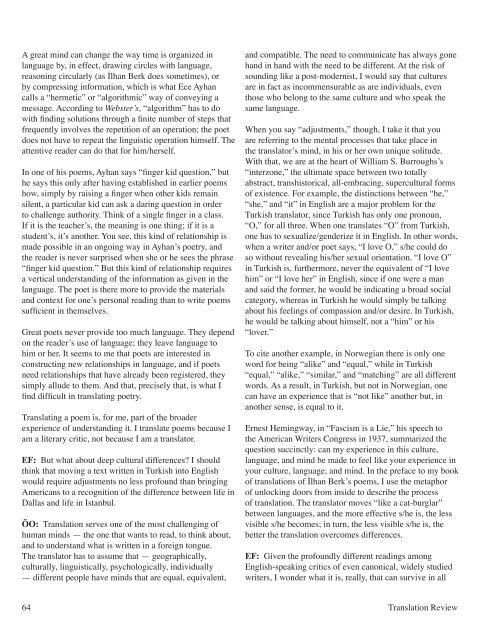Translation Review - The University of Texas at Dallas
Translation Review - The University of Texas at Dallas
Translation Review - The University of Texas at Dallas
Create successful ePaper yourself
Turn your PDF publications into a flip-book with our unique Google optimized e-Paper software.
A gre<strong>at</strong> mind can change the way time is organized in<br />
language by, in effect, drawing circles with language,<br />
reasoning circularly (as İlhan Berk does sometimes), or<br />
by compressing inform<strong>at</strong>ion, which is wh<strong>at</strong> Ece Ayhan<br />
calls a “hermetic” or “algorithmic” way <strong>of</strong> conveying a<br />
message. According to Websterʼs, “algorithm” has to do<br />
with fi nding solutions through a fi nite number <strong>of</strong> steps th<strong>at</strong><br />
frequently involves the repetition <strong>of</strong> an oper<strong>at</strong>ion; the poet<br />
does not have to repe<strong>at</strong> the linguistic oper<strong>at</strong>ion himself. <strong>The</strong><br />
<strong>at</strong>tentive reader can do th<strong>at</strong> for him/herself.<br />
In one <strong>of</strong> his poems, Ayhan says “fi nger kid question,” but<br />
he says this only after having established in earlier poems<br />
how, simply by raising a fi nger when other kids remain<br />
silent, a particular kid can ask a daring question in order<br />
to challenge authority. Think <strong>of</strong> a single fi nger in a class.<br />
If it is the teacherʼs, the meaning is one thing; if it is a<br />
studentʼs, itʼs another. You see, this kind <strong>of</strong> rel<strong>at</strong>ionship is<br />
made possible in an ongoing way in Ayhanʼs poetry, and<br />
the reader is never surprised when she or he sees the phrase<br />
“fi nger kid question.” But this kind <strong>of</strong> rel<strong>at</strong>ionship requires<br />
a vertical understanding <strong>of</strong> the inform<strong>at</strong>ion as given in the<br />
language. <strong>The</strong> poet is there more to provide the m<strong>at</strong>erials<br />
and context for oneʼs personal reading than to write poems<br />
suffi cient in themselves.<br />
Gre<strong>at</strong> poets never provide too much language. <strong>The</strong>y depend<br />
on the readerʼs use <strong>of</strong> language; they leave language to<br />
him or her. It seems to me th<strong>at</strong> poets are interested in<br />
constructing new rel<strong>at</strong>ionships in language, and if poets<br />
need rel<strong>at</strong>ionships th<strong>at</strong> have already been registered, they<br />
simply allude to them. And th<strong>at</strong>, precisely th<strong>at</strong>, is wh<strong>at</strong> I<br />
fi nd diffi cult in transl<strong>at</strong>ing poetry.<br />
Transl<strong>at</strong>ing a poem is, for me, part <strong>of</strong> the broader<br />
experience <strong>of</strong> understanding it. I transl<strong>at</strong>e poems because I<br />
am a literary critic, not because I am a transl<strong>at</strong>or.<br />
EF: But wh<strong>at</strong> about deep cultural differences? I should<br />
think th<strong>at</strong> moving a text written in Turkish into English<br />
would require adjustments no less pr<strong>of</strong>ound than bringing<br />
Americans to a recognition <strong>of</strong> the difference between life in<br />
<strong>Dallas</strong> and life in Istanbul.<br />
ÖO: <strong>Transl<strong>at</strong>ion</strong> serves one <strong>of</strong> the most challenging <strong>of</strong><br />
human minds — the one th<strong>at</strong> wants to read, to think about,<br />
and to understand wh<strong>at</strong> is written in a foreign tongue.<br />
<strong>The</strong> transl<strong>at</strong>or has to assume th<strong>at</strong> — geographically,<br />
culturally, linguistically, psychologically, individually<br />
— different people have minds th<strong>at</strong> are equal, equivalent,<br />
and comp<strong>at</strong>ible. <strong>The</strong> need to communic<strong>at</strong>e has always gone<br />
hand in hand with the need to be different. At the risk <strong>of</strong><br />
sounding like a post-modernist, I would say th<strong>at</strong> cultures<br />
are in fact as incommensurable as are individuals, even<br />
those who belong to the same culture and who speak the<br />
same language.<br />
When you say “adjustments,” though, I take it th<strong>at</strong> you<br />
are referring to the mental processes th<strong>at</strong> take place in<br />
the transl<strong>at</strong>orʼs mind, in his or her own unique solitude.<br />
With th<strong>at</strong>, we are <strong>at</strong> the heart <strong>of</strong> William S. Burroughsʼs<br />
“interzone,” the ultim<strong>at</strong>e space between two totally<br />
abstract, transhistorical, all-embracing, supercultural forms<br />
<strong>of</strong> existence. For example, the distinctions between “he,”<br />
“she,” and “it” in English are a major problem for the<br />
Turkish transl<strong>at</strong>or, since Turkish has only one pronoun,<br />
“O,” for all three. When one transl<strong>at</strong>es “O” from Turkish,<br />
one has to sexualize/genderize it in English. In other words,<br />
when a writer and/or poet says, “I love O,” s/he could do<br />
so without revealing his/her sexual orient<strong>at</strong>ion. “I love O”<br />
in Turkish is, furthermore, never the equivalent <strong>of</strong> “I love<br />
him” or “I love her” in English, since if one were a man<br />
and said the former, he would be indic<strong>at</strong>ing a broad social<br />
c<strong>at</strong>egory, whereas in Turkish he would simply be talking<br />
about his feelings <strong>of</strong> compassion and/or desire. In Turkish,<br />
he would be talking about himself, not a “him” or his<br />
“lover.”<br />
To cite another example, in Norwegian there is only one<br />
word for being “alike” and “equal,” while in Turkish<br />
“equal,” “alike,” “similar,” and “m<strong>at</strong>ching” are all different<br />
words. As a result, in Turkish, but not in Norwegian, one<br />
can have an experience th<strong>at</strong> is “not like” another but, in<br />
another sense, is equal to it.<br />
Ernest Hemingway, in “Fascism is a Lie,” his speech to<br />
the American Writers Congress in 1937, summarized the<br />
question succinctly: can my experience in this culture,<br />
language, and mind be made to feel like your experience in<br />
your culture, language, and mind. In the preface to my book<br />
<strong>of</strong> transl<strong>at</strong>ions <strong>of</strong> İlhan Berkʼs poems, I use the metaphor<br />
<strong>of</strong> unlocking doors from inside to describe the process<br />
<strong>of</strong> transl<strong>at</strong>ion. <strong>The</strong> transl<strong>at</strong>or moves “like a c<strong>at</strong>-burglar”<br />
between languages, and the more effective s/he is, the less<br />
visible s/he becomes; in turn, the less visible s/he is, the<br />
better the transl<strong>at</strong>ion overcomes differences.<br />
EF: Given the pr<strong>of</strong>oundly different readings among<br />
English-speaking critics <strong>of</strong> even canonical, widely studied<br />
writers, I wonder wh<strong>at</strong> it is, really, th<strong>at</strong> can survive in all<br />
64 <strong>Transl<strong>at</strong>ion</strong> <strong>Review</strong>

















